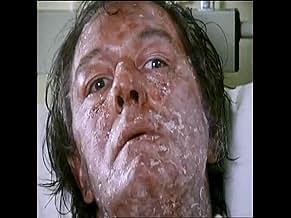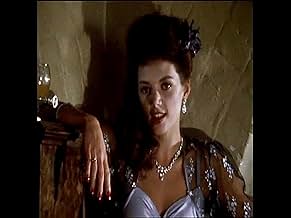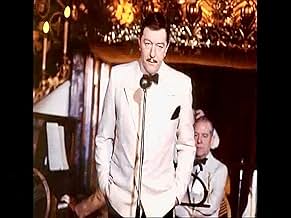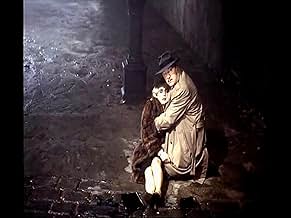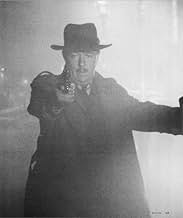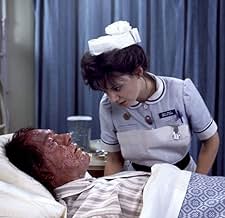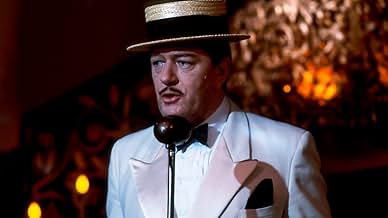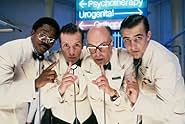The Singing Detective
- Minissérie de televisão
- 1986
- 1 h 10 min
AVALIAÇÃO DA IMDb
8,5/10
5 mil
SUA AVALIAÇÃO
Adicionar um enredo no seu idiomaTormented and bedridden by a debilitating disease, a mystery writer relives his detective stories through his imagination and hallucinations.Tormented and bedridden by a debilitating disease, a mystery writer relives his detective stories through his imagination and hallucinations.Tormented and bedridden by a debilitating disease, a mystery writer relives his detective stories through his imagination and hallucinations.
- Ganhou 3 prêmios BAFTA
- 6 vitórias e 8 indicações no total
Explorar episódios
Avaliações em destaque
About to watch the 'The Singing Detective' in its entirity for the first time in 18 years, one is filled with anticipation but also anxiety. Supposing it's dated, or that its once revolutionary nature has been so widely copied (one thinks here of its multi-layered structure, or the scene where Michael Gambon tries to avoid having an erection) that it will be impossible to remember quite how fresh it seemed on first viewing. Worst of all, perhaps it's simply not as good as remembered? When the piece started slowly, I feared that disappointment indeed awaited. But soon I fell again into its magical rhythmns, and, mesmerised, have just (with the aid of DVD) consumed the final five hours in a single weekend. Mesmerised but not surprised - the power of the piece is such that almost every scene, almost every line of dialogue seemed familiar. The last film I saw I had in fact seen previously, and much less than 18 years before, but I had forgotten it entirely and would not have even realised except for a one memorable detail. By contrast, in Dennis Potter's masterpiece, when a single scene failed to trigger recognition, it seemed horribly wrong, as every other incident was written on my brain.
For those who don't know, 'The Singing Detective' is an offbeat musical about a writer in hospital, that weaves effortlessly his present experiences, his past fictions, his paranoid imaginings and, above all else, the memories of a childhood that to this day still dominates his life. Wildly imaginative, but grounded in Potter's own autobiography, it constitutes an enormously rich and vivid telling of a fundamentally very simple story. Potter celebrates life, but refuses to assign it any false dignity. The extent to which he strips away the cant that helps make life bearable is truly disturbing, and perhaps explains the reason the religious right wanted it banned. The cover of my DVD says 'moderate nudity; mild language; no violence' and by modern standards this is correct. Which only damns the moderns; but Potter knew truly how to shock.
Put simply, everything is right about this series. The dialogue is caustic and hilarious; the direction spot on; the acting brilliant. The song and dance routines are coreographed precisely, economically, but to devastating effect. In fact, the construction of the whole work has the feel of jazz to it, the same themes repeated with minor variation, building to a whole that exceeds the mere parts. And the faces in this drama are the most wonderfully expressive faces you will ever see. I was going to call their expressiveness stylised, in that no-one's real face ever really gives away so much. But these, of course, are the faces of the memory, a lifetime's trauma captured in a single tearful eye.
The cast clearly rose to the material. Gambon gives a virtuoso acting masterclass, supreme in both his roles (he plays both the writer and his creation); and though the writer undergoes a major personal journey during the course of this story, Gambon is as good at the end as at the start. While Joanne Whalley, Bill Paterson (with his beard and accent, he makes me think of Robin Cook!) and (in a virtually silent role) Jim Carter have never done anything better. Often overlooked, meanwhile, is the stunning performance from (the subsequently obscure) Lyndon Davies from as Gambon's younger self.
Potter spent his entire career trying new ways of writing screenplays. It didn't always come off and after this work, little he produced was of merit. But 'The Singing Detective' hits no false notes. If there's been a better series made for television, I haven't seen it.
For those who don't know, 'The Singing Detective' is an offbeat musical about a writer in hospital, that weaves effortlessly his present experiences, his past fictions, his paranoid imaginings and, above all else, the memories of a childhood that to this day still dominates his life. Wildly imaginative, but grounded in Potter's own autobiography, it constitutes an enormously rich and vivid telling of a fundamentally very simple story. Potter celebrates life, but refuses to assign it any false dignity. The extent to which he strips away the cant that helps make life bearable is truly disturbing, and perhaps explains the reason the religious right wanted it banned. The cover of my DVD says 'moderate nudity; mild language; no violence' and by modern standards this is correct. Which only damns the moderns; but Potter knew truly how to shock.
Put simply, everything is right about this series. The dialogue is caustic and hilarious; the direction spot on; the acting brilliant. The song and dance routines are coreographed precisely, economically, but to devastating effect. In fact, the construction of the whole work has the feel of jazz to it, the same themes repeated with minor variation, building to a whole that exceeds the mere parts. And the faces in this drama are the most wonderfully expressive faces you will ever see. I was going to call their expressiveness stylised, in that no-one's real face ever really gives away so much. But these, of course, are the faces of the memory, a lifetime's trauma captured in a single tearful eye.
The cast clearly rose to the material. Gambon gives a virtuoso acting masterclass, supreme in both his roles (he plays both the writer and his creation); and though the writer undergoes a major personal journey during the course of this story, Gambon is as good at the end as at the start. While Joanne Whalley, Bill Paterson (with his beard and accent, he makes me think of Robin Cook!) and (in a virtually silent role) Jim Carter have never done anything better. Often overlooked, meanwhile, is the stunning performance from (the subsequently obscure) Lyndon Davies from as Gambon's younger self.
Potter spent his entire career trying new ways of writing screenplays. It didn't always come off and after this work, little he produced was of merit. But 'The Singing Detective' hits no false notes. If there's been a better series made for television, I haven't seen it.
This is Dennis Potter's 'Sergeant Pepper' - the work of his life. One of those times when the recurring themes and characters from an artist's collected works come together at the right moment, with the right direction and the right actors.
The story is simple - embittered, sarcastic, over-the-hill author is admitted to hospital with a highly disfiguring skin condition. Whilst lying virtually helpless in his bed, he begins to rewrite one of his pulp novels (The Singing Detective) and to reminisce on his childhood in the Forest of Dean and London. But the memories and fiction start to overlap, with some hallucinations thrown in for good measure!
In the hands of lesser mortals, this could have been a disaster (I fear for the 2003 remake. Robert Downey Jr?!). But the direction of Amiel and the acting of the entire cast are outstanding. Michael Gambon is stunning as the (initially) sour and downright nasty Marlowe. That we sympathise with him given all of his shortcomings is testament to this.
The subtext is of a man exorcising his demons and coming to terms with his guilt: guilt about the death of his mother, guilt about his treatment of the women in his life, guilt about his victimisation of a schoolmate.
One of those films that is like a giant jigsaw - at first what appear to be a random collection of unrelated images which are rearranged, flipped over and pieced together. Ultimately we are presented with solutions to everything - almost.
After all, not everything has a solution...
The story is simple - embittered, sarcastic, over-the-hill author is admitted to hospital with a highly disfiguring skin condition. Whilst lying virtually helpless in his bed, he begins to rewrite one of his pulp novels (The Singing Detective) and to reminisce on his childhood in the Forest of Dean and London. But the memories and fiction start to overlap, with some hallucinations thrown in for good measure!
In the hands of lesser mortals, this could have been a disaster (I fear for the 2003 remake. Robert Downey Jr?!). But the direction of Amiel and the acting of the entire cast are outstanding. Michael Gambon is stunning as the (initially) sour and downright nasty Marlowe. That we sympathise with him given all of his shortcomings is testament to this.
The subtext is of a man exorcising his demons and coming to terms with his guilt: guilt about the death of his mother, guilt about his treatment of the women in his life, guilt about his victimisation of a schoolmate.
One of those films that is like a giant jigsaw - at first what appear to be a random collection of unrelated images which are rearranged, flipped over and pieced together. Ultimately we are presented with solutions to everything - almost.
After all, not everything has a solution...
10jimi99
There's no question that the greatest films of the past 25 years have been TV miniseries, from "I Claudius" to "The Decalogue" to "Nicholas Nickleby" to "The Singing Detective." The ability to stretch out over 6 to 10 hours is certainly a key to doing justice to a theme or great work of literature.
"The Singing Detective" is a bold, multileveled BBC series that is made all the more powerful considering that it is based on the author Dennis Potter's losing battle with a skin disease combined with his incredibly rich fantasies, painful memories, and writer's imagination, all rolled into one complex narrative. Over the 6-hour span, his life and personality, as portrayed by the brilliant Michael Gambon as the writer/novel protagonist Philip Marlow (without the "e"), is revealed inventively and poignantly. We sympathize with his wasting disease, admire his clever mind, and see all his hang-ups and "sins" gradually bared to his audience. It is an amazing swan song for a brutally self-honest writer.
Jon Amiel's direction is impeccable, and the whole production is uncompromising regarding sex, nudity, language and emotional pain. The famous musical numbers featuring not only Philip and his father in the past, but projected onto the patients and staff of the hospital ward where the "real" present action takes place, are so integral to the story that they are a perfect reflection of Philip's tenuous grip on reality.
The forthcoming Keith Gordon feature film, no matter how inventive and bizarre it is, must fail artistically and be suspected of dishonoring the essence of the story, Dennis Potter's autobiography. It will probably succeed financially with the casting of Downey and Gibson, but please find the BBC series at your local library and enjoy this masterpiece.
"The Singing Detective" is a bold, multileveled BBC series that is made all the more powerful considering that it is based on the author Dennis Potter's losing battle with a skin disease combined with his incredibly rich fantasies, painful memories, and writer's imagination, all rolled into one complex narrative. Over the 6-hour span, his life and personality, as portrayed by the brilliant Michael Gambon as the writer/novel protagonist Philip Marlow (without the "e"), is revealed inventively and poignantly. We sympathize with his wasting disease, admire his clever mind, and see all his hang-ups and "sins" gradually bared to his audience. It is an amazing swan song for a brutally self-honest writer.
Jon Amiel's direction is impeccable, and the whole production is uncompromising regarding sex, nudity, language and emotional pain. The famous musical numbers featuring not only Philip and his father in the past, but projected onto the patients and staff of the hospital ward where the "real" present action takes place, are so integral to the story that they are a perfect reflection of Philip's tenuous grip on reality.
The forthcoming Keith Gordon feature film, no matter how inventive and bizarre it is, must fail artistically and be suspected of dishonoring the essence of the story, Dennis Potter's autobiography. It will probably succeed financially with the casting of Downey and Gibson, but please find the BBC series at your local library and enjoy this masterpiece.
There's no point in reiterating the praise for this miniseries. Many have called it the best television production ever, and as far as I can tell, they're absolutely correct. This is (NBC notwithstanding) the true definition of 'must-see TV'.
I just want to comment on something that struck me when I watched this recently on DVD. There's no way that an actor like Michael Gambon could ever get cast as the leading man in an American production (for TV or movies). He's just not physically attractive enough in the conventional sense; for example, he has the beginnings of a double-chin (more of a sloping-down from his chin to his collar), and I can't imagine any American producer being willing to give such an "not hot" actor so much screen time in the lead role.
Yet, it hardly needs be said, he is 100% perfect in this role, and it's hard to imagine anyone else doing as good a job. He can convey more feeling (rage, helplessness, love, hatred) in one close-up of his eyes than some actors do in their entire careers. His presence in this film is, in a sense, a reminder of how lucky we all are that it ever got made at all, by a BBC that was willing to give producer Kenith Trodd almost complete autonomy, as long as he stayed within budget. With the possible exception of HBO, you just don't see that sort of artistic freedom too often over on this side of the pond.
Anyway, as others said, it's a masterpiece, brilliantly written and brilliantly acted. Truly one of the most incredible uses of the television medium ever.
I just want to comment on something that struck me when I watched this recently on DVD. There's no way that an actor like Michael Gambon could ever get cast as the leading man in an American production (for TV or movies). He's just not physically attractive enough in the conventional sense; for example, he has the beginnings of a double-chin (more of a sloping-down from his chin to his collar), and I can't imagine any American producer being willing to give such an "not hot" actor so much screen time in the lead role.
Yet, it hardly needs be said, he is 100% perfect in this role, and it's hard to imagine anyone else doing as good a job. He can convey more feeling (rage, helplessness, love, hatred) in one close-up of his eyes than some actors do in their entire careers. His presence in this film is, in a sense, a reminder of how lucky we all are that it ever got made at all, by a BBC that was willing to give producer Kenith Trodd almost complete autonomy, as long as he stayed within budget. With the possible exception of HBO, you just don't see that sort of artistic freedom too often over on this side of the pond.
Anyway, as others said, it's a masterpiece, brilliantly written and brilliantly acted. Truly one of the most incredible uses of the television medium ever.
The BBC television production of "The Singing Detective" caused a huge stir when it was first broadcast back in 1986, and now it is commonly acknowledged as a classic.
Hospitalised by a severe case of psoriasis, crime novelist Philip E Marlow, escapes the grim realities of ward life into a rich inner world where he imagines himself as the "singing detective", hero of his own novels. From these fantasies he drifts to memories of his grim childhood during World War Two, and paranoid fantasies about his estranged wife.
The script, by celebrated writer Dennis Potter, is truly remarkable. The acting is good, especially from Michael Gambon (as Philip Marlow) who is perfect in a very difficult role.
The series lasts nearly seven hours and yet never fails to entertain. The series has a rich vain of dark humour and features some hilariously surreal song-and-dance sequences.
This is a true masterpiece and, very possibly, the best TV series ever made. Don't miss any opportunity to catch it.
Hospitalised by a severe case of psoriasis, crime novelist Philip E Marlow, escapes the grim realities of ward life into a rich inner world where he imagines himself as the "singing detective", hero of his own novels. From these fantasies he drifts to memories of his grim childhood during World War Two, and paranoid fantasies about his estranged wife.
The script, by celebrated writer Dennis Potter, is truly remarkable. The acting is good, especially from Michael Gambon (as Philip Marlow) who is perfect in a very difficult role.
The series lasts nearly seven hours and yet never fails to entertain. The series has a rich vain of dark humour and features some hilariously surreal song-and-dance sequences.
This is a true masterpiece and, very possibly, the best TV series ever made. Don't miss any opportunity to catch it.
Você sabia?
- CuriosidadesThe first time Sir Michael Gambon was wheeled onto set in his full make-up, all the cast and crew were reduced to a stunned silence. Gambon broke the ice by saying "What's all this fuss about Chernobyl then? I went there for a holiday and it didn't do me any harm."
- Citações
Philip Marlow: I used to think that all I wanted was the good opinion of honorable men and the ungrudging love of beautiful women. Now I know for sure that all I really want is a cigarette.
- ConexõesFeatured in Arena: Dennis Potter (1987)
- Trilhas sonorasPeg o' My Heart
(uncredited)
Music by Fred Fisher
Performed by Max Harris & His Novelty Trio during the credits
Principais escolhas
Faça login para avaliar e ver a lista de recomendações personalizadas
- How many seasons does The Singing Detective have?Fornecido pela Alexa
Detalhes
Contribua para esta página
Sugerir uma alteração ou adicionar conteúdo ausente

Principal brecha
By what name was The Singing Detective (1986) officially released in India in English?
Responda

